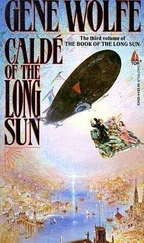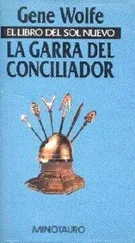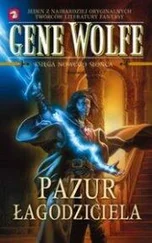Gene Wolfe - On Blue's waters
Здесь есть возможность читать онлайн «Gene Wolfe - On Blue's waters» весь текст электронной книги совершенно бесплатно (целиком полную версию без сокращений). В некоторых случаях можно слушать аудио, скачать через торрент в формате fb2 и присутствует краткое содержание. Год выпуска: 2000, ISBN: 2000, Издательство: Macmillan, Жанр: Фантастика и фэнтези, на английском языке. Описание произведения, (предисловие) а так же отзывы посетителей доступны на портале библиотеки ЛибКат.
- Название:On Blue's waters
- Автор:
- Издательство:Macmillan
- Жанр:
- Год:2000
- ISBN:9780312872571
- Рейтинг книги:4 / 5. Голосов: 1
-
Избранное:Добавить в избранное
- Отзывы:
-
Ваша оценка:
- 80
- 1
- 2
- 3
- 4
- 5
On Blue's waters: краткое содержание, описание и аннотация
Предлагаем к чтению аннотацию, описание, краткое содержание или предисловие (зависит от того, что написал сам автор книги «On Blue's waters»). Если вы не нашли необходимую информацию о книге — напишите в комментариях, мы постараемся отыскать её.
On Blue's waters — читать онлайн бесплатно полную книгу (весь текст) целиком
Ниже представлен текст книги, разбитый по страницам. Система сохранения места последней прочитанной страницы, позволяет с удобством читать онлайн бесплатно книгу «On Blue's waters», без необходимости каждый раз заново искать на чём Вы остановились. Поставьте закладку, и сможете в любой момент перейти на страницу, на которой закончили чтение.
Интервал:
Закладка:
Perhaps all gods and goddesses are very large; certainly Echidna was when I saw her in our Sacred Window. Our gods, the gods of Old Viron, dwelt in Mainframe. I saw Mainframe in company with Nettle and many others, and even what I saw was a very large place, although I was told that most of it was underground. It may be that our gods did not come among us except by enlightenment and possession because they were too large to do so; even the godlings that they send among the people now are, for the most part, immense. A man may like insects. Some men do. A man who likes them may make them gifts, giving a crumb soaked in honey or some such thing. But although that man may walk, he may not walk with his pets the insects. He is too big for it.
So it is, I believe, with the Mother. She dwells in the sea, and Seawrack spoke of hiding at times within her body as one might speak of taking shelter in the Grand Manteion, the Palace, or some other big building. Possibly the Mother’s worshippers cast their sacrifices into the waves instead of burning them. (I do not know, and offer the suggestion as a mere guess.) What seems certain is that her worshippers were the Vanished People, whom I did not then call the Neighbors; and that they are gone, although not entirely gone.
She waits.
For what I do not know. It may be for her worshippers to return again. Or for us to become her new worshippers, as we well may.
Or perhaps merely for death. She shaped herself, I believe, a woman of the Vanished People so that they would love her. We are here now, and so she shaped for me a woman of my own race-a woman beside whom Chenille would stand like a child-who could sing and speak to me. Beneath it the old sea goddess waited, and was not of our human race, nor of the race of the Vanished People, whom I was to come to know.
I once had a toy, a little wooden man in a blue coat who was moved by strings. When I played with him, I made him walk and bow, and spoke for him. I practiced until I thought myself very clever. One day I saw my mother holding the two sticks that held his strings, and my little wooden man saluting my youngest sister much more cleverly than I could have made him do it, and laughing with his head thrown back, then mourning with his face in his hands. I never spoke of it to my mother, but I was angry and ashamed.
It has been a long while since I wrote last. How long I am not sure. I went to Skany as its ambassadors asked, and remained there most of the summer. Now I have returned to this fine, airy house my people here have built for me, which they enlarged while I was gone. The west wing was torn to pieces by a storm, they tell me; but they have rebuilt it and made it larger and stronger, so that I walk there among rooms that seem familiar and feel that I have shrunk.
The storms are worse. Green is great in the sky. Like the eye of a devil, people say; but the truth for me is that it is so large that I look up at it and think on other days, and fancy sometimes that I can smell the rot, and see the trees that are eating trees that are eating trees. I never hear the wild song of the wind without recalling other days still, and how we built our house and our mill, Nettle.
You were the dream of my boyhood. You shared my life, and I shared yours, and together we brought forth new lives. Who can say what the end of that may be? Only the Outsider. He is wise, Nettle. So wise. And because he is, he is just.
I hear the wind’s song now at my window. I have opened the shutters. The flame of my lamp flickers and smokes. Through the open window I see Green, which will be gone in an hour as it passes beyond the windowframe. I want to call out to you that the tides are coming; but no doubt they have come already. It may be that the log walls of our house are turning and leaping in the waves as I write. Time is a sea greater than our sea. You knew that long before I went away. I have learned it here. Its tides batter down all walls, and what the tides of time batter down is never rebuilt.
Not larger.
Not smaller.
Never as it was.
I see that before I left for Skany, that glorious, corrupt town, I wrote of how Seawrack and I slept in the cubby of the sloop, with Babbie sleeping too at our feet, or at least at times pretending to sleep so that he could be in our company; and I said that we did not sleep long.
Nor did we. I remember lying like that, then turning on my back so that both my ears might listen. I wrote about the song of the wind, too; but I am not certain that I had ever really heard it until that night, although I thought I had. To hear the song of the wind truly, as I heard it that night, I think that you must hear it as I did, lying on your back in a rocking, pitching boat upon the wide, wide sea, with a woman younger than yourself asleep beside you.
The wind was a woman, too. Sometimes it was a woman like General Mint, a small woman with a neat, pure, honest little face, a woman in flowing black astride the tallest white stallion anyone ever saw, singing as she rode like a flame before a thousand wild troopers who rode as she did or ran like wolves, firing and reloading as they came and halting only to die.
And sometimes the wind was a woman like the tall, proud women of Trivigaunte, galloping along Sun Street with their heads up and their lances leveled, women singing to their wonderful horses, horses that had always to be held back and never had to be urged forward. And sometimes the wind was a singing woman like the one beside me, a sea woman who sings like her Mother, a woman that no one ever completely understands, with silver-blue combers in her eyes.
As I listened, the wind seemed to me more and more to be all three women and a million more, spurred onward-faster, always faster-by the rumbling voice of Pas. Beneath me, the sloop was lifted by giant’s hand, and rolled so far that Seawrack was tumbled onto me and clutching me in fear while Babbie squealed at the tiller. Outside the shelter of the foredeck, I was drenched to the skin in an instant. It was pitch dark except when the lightning flashed, and the sloop was laid over on her beam ends and in danger of being dismasted. I meant to cut her moorings before they pulled her under, but there was no need. The stakes I had pushed into the damp softness of that mossy shore had pulled free, and we were being driven before the storm like a child’s lost boat or a stick of driftwood, half foundering. I put out the little jib, hoping to steady her and keep her stern to the waves, but had hardly set it before it was carried away.
I will not write about everything that took place that night, because most of it would be of interest only to sailors, who are not apt to be found so far inland as this. I rigged a sea anchor that tamed the diabolical pandemonium of boat and storm to mere insanity; and Seawrack and I bailed and bailed until I thought my arms would fall off of my shoulders; but the sloop never foundered or sunk, or lost a stick. I have never been prouder of something that I myself have made, not even my mill.
What I want to tell whoever may read this is that in the flashes of lightning, which for whole hours were so frequent as to provide a hectic illumination that was nearly constant, I saw the green plain part for us, ripped in two by the fury of the waves, and seeing it so-lifted by great waves at one moment, then crashing down upon the sea again at the next-I knew it for what it was.
At that place in the middle of the sea, the bottom is not leagues removed from the surface; but is, as Seawrack confirmed for me, not more than two or three chains distant from it. Great herbs (I do not know what else to call them) grow there that are not trees, nor grasses, nor ferns, but share the natures of all three. Their tangled branches, lying upon the surface, are draped with the smooth green life over which Babbie and I wandered. It may be that it covers them as orchids cover our trees here in Gaon, or as strangling lianas cover the cannibal trees of Green. Or it may be that they cover themselves with it as the trees of land cover themselves with leaves and fruit. I do not know. But I know that it is so, because I saw it that night. I saw what I had once thought islands torn like banana leaves, and tossed like flotsam by the waves.
Читать дальшеИнтервал:
Закладка:
Похожие книги на «On Blue's waters»
Представляем Вашему вниманию похожие книги на «On Blue's waters» списком для выбора. Мы отобрали схожую по названию и смыслу литературу в надежде предоставить читателям больше вариантов отыскать новые, интересные, ещё непрочитанные произведения.
Обсуждение, отзывы о книге «On Blue's waters» и просто собственные мнения читателей. Оставьте ваши комментарии, напишите, что Вы думаете о произведении, его смысле или главных героях. Укажите что конкретно понравилось, а что нет, и почему Вы так считаете.











